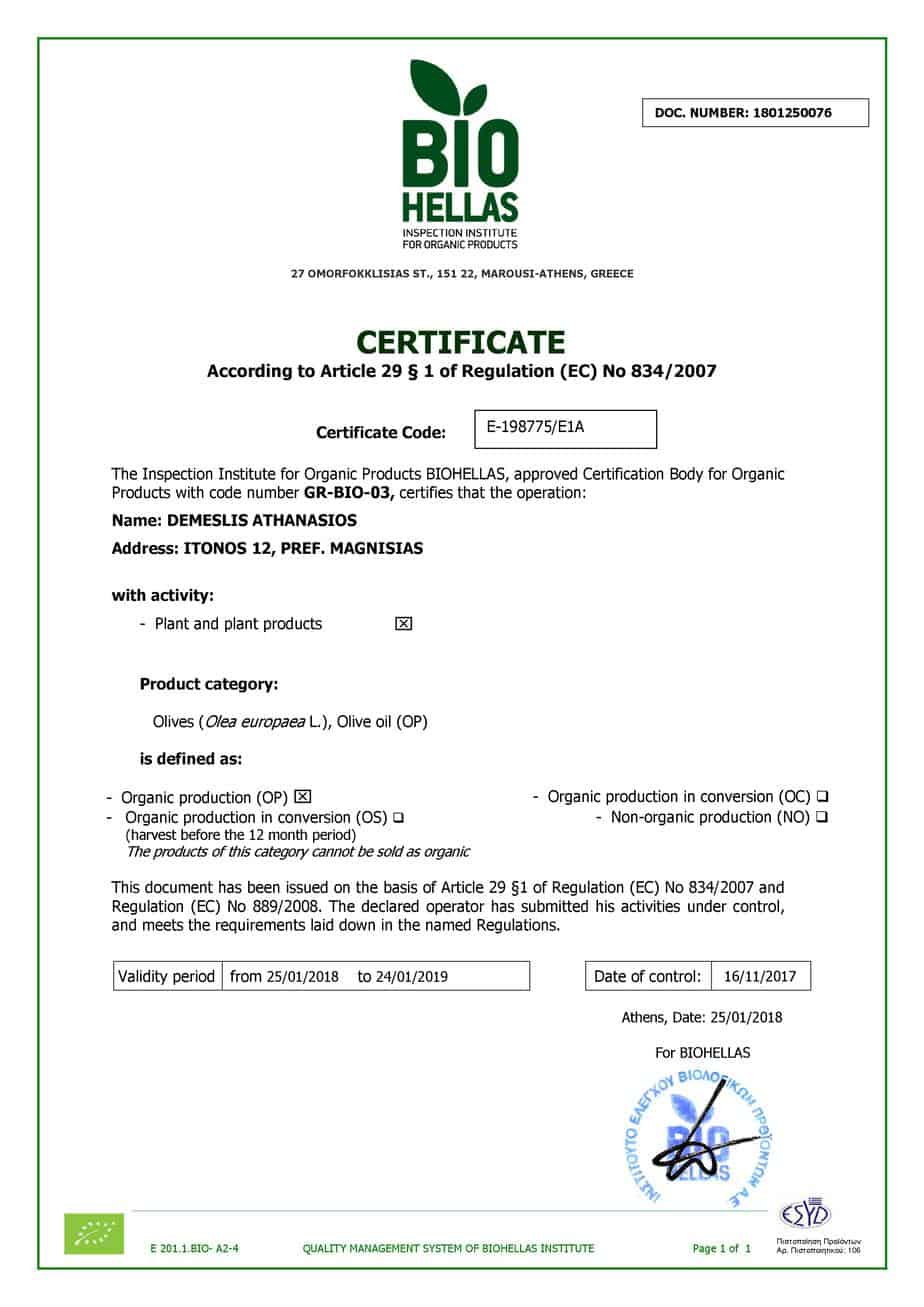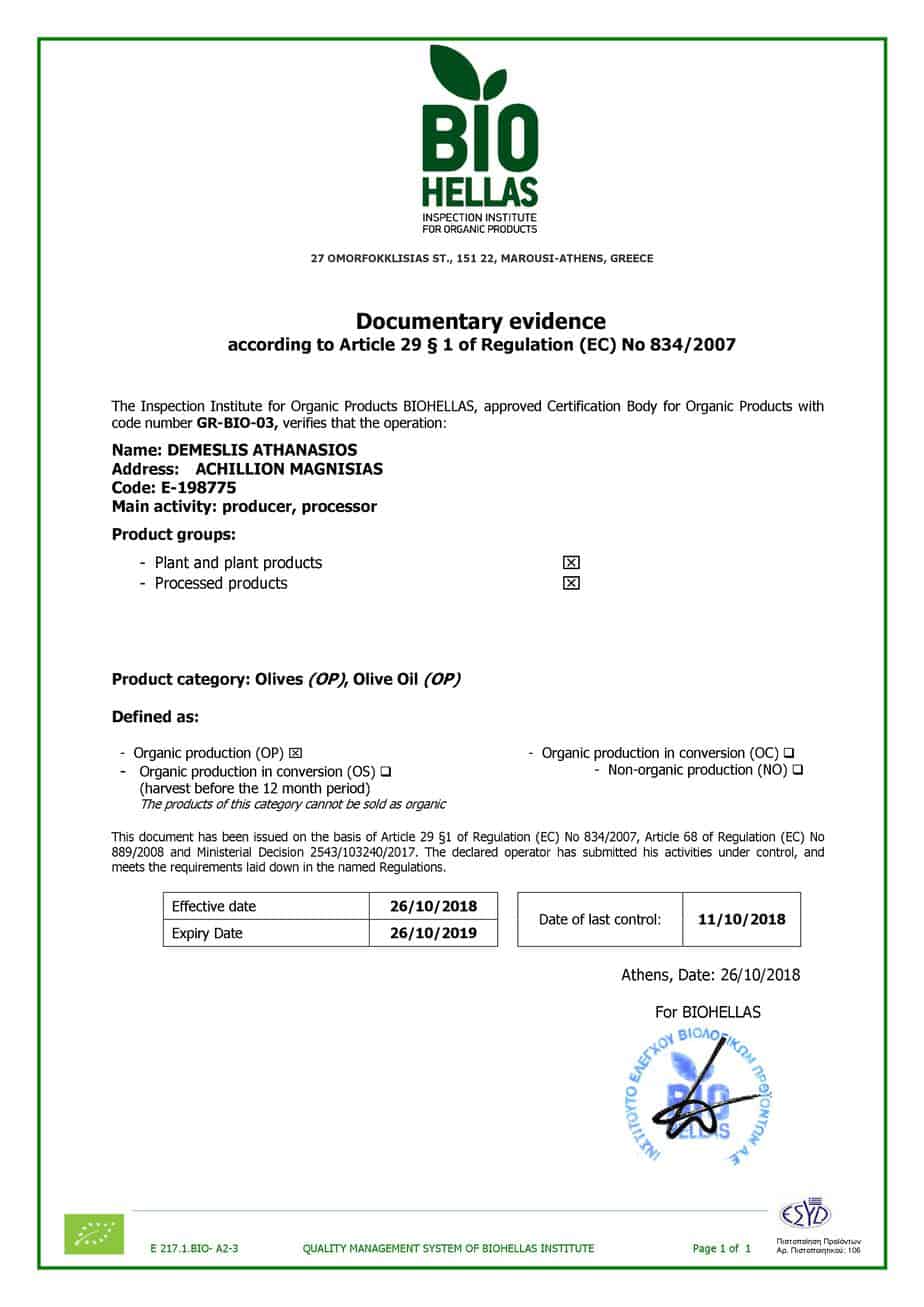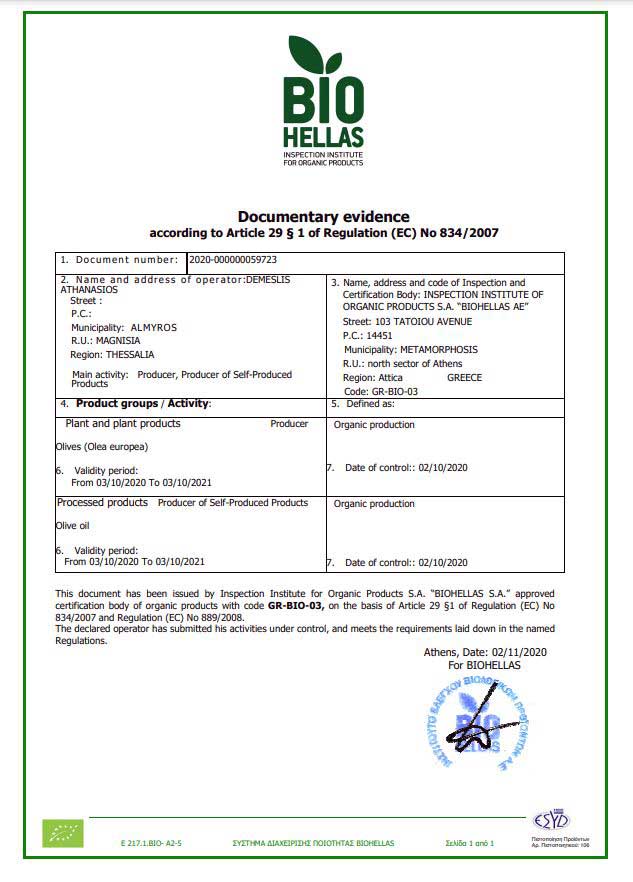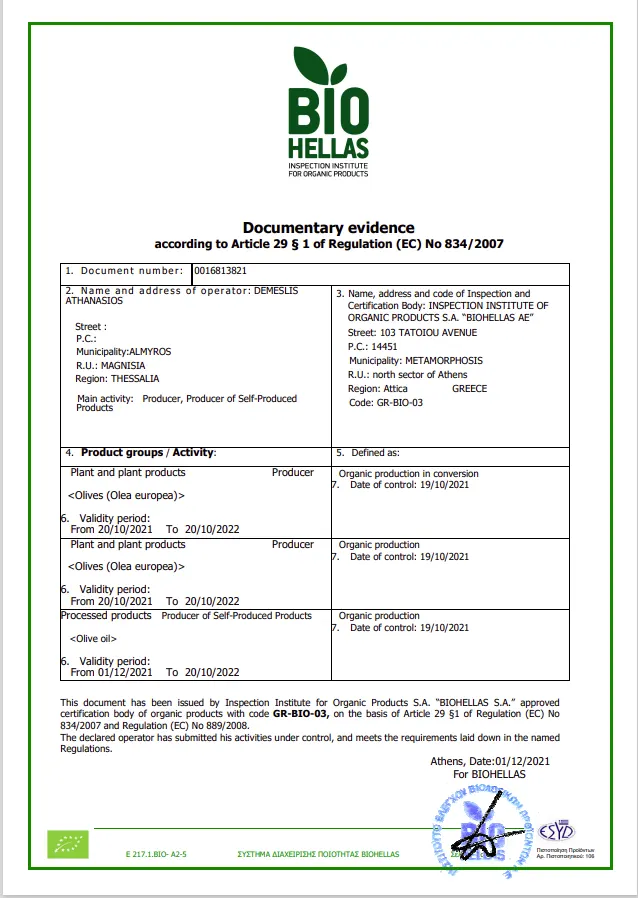Organic Olive Oil:
Learn to Identify the Real Thing
Written by: Athanasios Demeslis, Producer of Myrolion
Last Update: January 29th 2025
Read Time: 12′
Many consumers ask themselves, “Is organic olive oil really worth the investment?”
By the conclusion of this article, you will grasp why organic extra virgin olive oil stands out as the top option. It is ideal for individuals who wish to provide their family and friends with safe and nutritious olive oil.
Furthermore, you will learn about the sustainability of Greek organic extra virgin olive oil (OEVOO).
I will also offer recommendations for authentic organic olive oil brands.
Key Takeaways
1. Organic Olive Oil does not contain any chemical residues. This means it is free from synthetic plant protection products (PPPs) and fertilizers.
2. Some sellers of regular olive oil claim that buying organic extra virgin olive oil is a waste of money. This is not true.
3. Certified organic olive oil always has specific labeling and certifications. These depend on where it comes from and where it is sold.
4. Due to limited controls there are fraudulent organic certificates out there. But there are ways to identify truly organic brands.
5. Organic EVOO does not contain potentially harmful chemicals. Its extra value comes from the way it is produced.
6. Conventional agriculture, including conventional olive oil production, is related to imbalance, desertification and is harmful to biodiversity.
7. While not all organic products are sustainable, specifically Greek organic olive oil is sustainable.
8. Regardless of the intended use of the olive oil you want to purchase, buying organic is easy thanks to the big pricing range.
9. We encourage you to talk with your supplier and, if possible, your producer. This way, you can learn as much as you can about your olive oil.
10. While many stores and brands offer organic products, it is better to choose brands that are 100% organic. Here are some suggestions.
What is the Real Value of Organic Olive Oil?
Organic olive oil is sometimes called bio-olive oil or eco-olive oil. People often view it from the consumer’s point of view. It is free from pesticides and herbicides, which means it does not contaminate our meals. And that’s great.
However, buying olive oil is not only about us anymore, it is about our collective home, the Earth.
As a producer who spends days on his groves, I believe there’s another, even more important aspect. Our family experiences the benefits of organic EVOO on the field.
Put simply, our olive farm looks like a natural olive forest. Our trees are part of a greater ecosystem in which all forms of life are respected and allowed to bloom. In return, all those beautiful bugs and flowers that embrace my trees are a great source of nutrients. Sometimes we fail to see the connection, which is indirect yet crucial.
By choosing truly organic olive oil, you help protect the biodiversity of the ecosystem. You support natural balance instead of constant artificial interference, which can cause long-term problems. The two images below will help you see the difference.
Organic Olive Farming
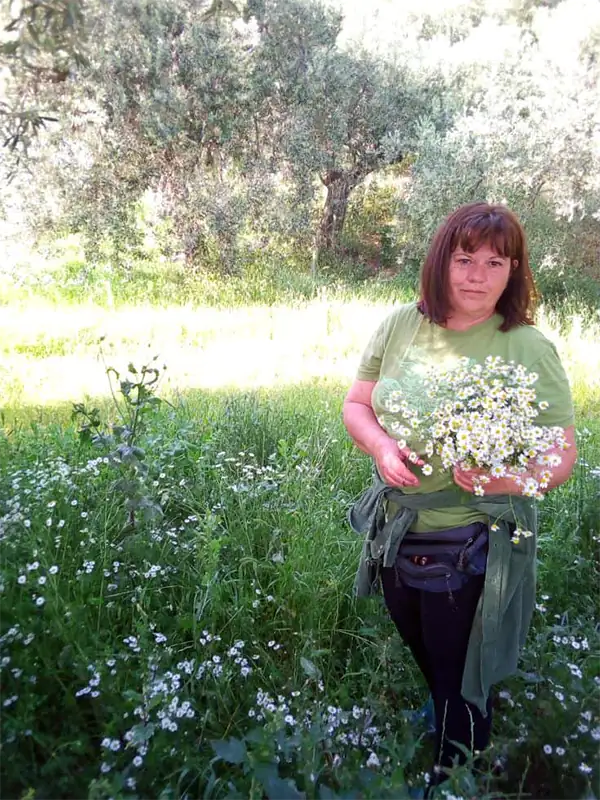
In this picture, Ioanna, my mother, is harvesting chamomile to later turn into relaxing chamomile tea. As you can see, she is in our olive groves, right in the shade of an olive tree.
An interesting result of organic farming is that my family can enjoy all the ecosystem offers. We have more than just olive oil or green olives. We also enjoy mountain weeds, oregano, wild asparagus, and mushrooms.
In the long run it’s a win-win situation. All these ingredients improve our daily diet as it resembles a hunger-gatherer diet.
At the same time, the trees benefit from hundreds of species. These include microbes, herbs, flowers, insects, and other animals. Together, they transform our olive groves into a natural olive forest.
Additionally, this diversity helps our organic extra virgin olive oil (EVOO) provide a wonderful culinary experience. It brings strong aromas, a delicate flavor, and overall freshness from this rich ecosystem.
Biodiversity is a key factor for a thriving ecosystem. Increased diversity provides more chances for an ecosystem to achieve natural balance.
We don’t see ourselves as the all-knowing, all-powerful rulers of our land. On the contrary, we allow Life to lead the way and we follow.
Another important part of this ecosystem is that more root systems act as a carbon sink. This means they help our land store carbon and makes it resilient to climate change.
Conventional Olive Farming
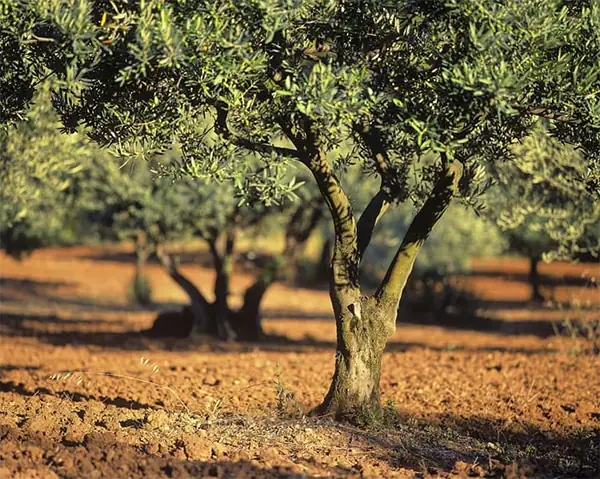
This is a photo of a conventional olive grove located in France. The lack of any form of life below the olive trees is shocking in comparison to our organic olive groves.
No microbes, flowers, herbs or animals have the chance to thrive in such an environment. In effect, it is not what we consider to be “Nature” anymore.
We are used to seeing images of tilled land, which is essentially stripped off organic matter. However, this old agricultural practice has proven to be harmful to ecosystems’ diversity.
This can result in food that is not very nutritious, due to soil depletion. It can also cause desertification and reduce the soil’s ability to store carbon.
Please take a moment to consider the two different types of soil. This will help you understand the greater importance of our Greek organic extra virgin olive oil.
What is Organic Olive Oil?
Organic olive oil contains no residues of industrially manufactured pesticides, herbicides and fertilizers.
To achieve this, the olive oil must be free of harmful substances at every stage. This includes cultivation, harvesting, pressing, filtration, storage, bottling, and shipping.
Is Organic Extra Virgin Olive Oil the Best Olive Oil?
Not necessarily. This is why it is possible to find really cheap organic olive oils out there. Also, it is possible to find very expensive organic olive oils that may not really deserve it. Organic production can lead to a higher price for olive oil. This increase usually ranges from 30% to 50%.
For more details and tips on olive oil pricing, please see our olive oil pricing guide and our olive oil buying guide.
Although being organic does not ensure top-notch quality, it is certainly essential for achieving premium quality. In simple terms, high-quality olive oil must be free from any potentially harmful residues.
What are the Benefits of Organic EVOO?
In a recent interview, Vasilis Frantzolas, a well-known olive oil consultant and educator, shared an important fact. He noted that each season, 2% to 4% of produced olive oil has higher than safe levels of pesticides.
Organic olive oil does not have residues from chemical pesticides, herbicides, fungicides, or fertilizers. These chemicals are often found in conventional olive oil.
In 2025, tests revealed olive oil samples with more than 200% of the safe level of Chlorpyrifos. This pesticide is banned and very toxic.
If this can happen in European markets, it is concerning. These markets are expected to be well-protected. This situation does not look good for conventional olive oil.
Despite bans, pesticides and herbicides still contaminate olive oil due to black market imports. For example:
Dimethoate: A typical pesticide that is used against the olive fruit fly, olive fruit’s most common enemy. Dimethoate is banned in France and most of Europe due to safety concerns for consumers.
If you buy conventional olive oil, you might be consuming small amounts of this chemical.
Fenthion: This insecticide is considered moderately toxic by the World Health Organization. However, it has a severe impact on the environment, especially on birds, even though it breaks down quickly.
Until now it has only been banned in Australia due to safety concerns. It is likely that conventionally produced olive oils from Greece, Italy, Spain, Turkey, Morocco, Tunisia, might contain residues of this.
Deltamethrin: It is a pyrethroid ester insecticide and is highly effective for pest control in agriculture and against malaria. Deltamethrin is generally considered safe to use around humans, even though it is a neurotoxin.
Even though deltamethrin is not as restricted as dimethoate or fenthion, it can still be harmful. Studies show that deltamethrin can pass through the skin and enter the bloodstream. It has even been found in the breast milk of pregnant women. You can read more about this here.
In addition, a French study revealed that exposure to this insecticide correlates to negative cognitive scores in infants. Deltamethrin is typically used in conventional olive farming against at least four pests.
Furthermore, it can serve as an allergen and may trigger asthma symptoms in certain individuals.
Finally, it is very harmful to aquatic life. Traces from large-scale farming can affect local water sources.
It is important to note that most of the effects mentioned above were found when deltamethrin was used as a house insecticide. This includes its use against mosquitoes, cockroaches, and other pests.
Cyhalothrin: This is a type of pyrethroid insecticide. The Global Harmonized System of Labeling and Classification of Chemicals (GHS) labels this substance as toxic. It is also considered harmful and poses an environmental hazard.
In the USA, the FDA restricts its use. The WHO and the Food and Agriculture Organization (FAO) say the safe daily intake is up to 0.02 mg per kg of body weight.
It can cause severe poisoning if consumed in higher concentrations. Unfortunately, it is severely harmful against honeybees. Concentrations as small as 0.04 micrograms can kill a bee.
Cyhalothrin is commonly employed to combat two well-known pests that affect olive fruit. However, its application can effectively turn the olive grove into an area devoid of bees and other life.
While these are the most popular insecticides used in olive farming, there are approximately thirty substances used in total.
Consuming conventional olive oil does not guarantee that you will also consume the above insecticides.
When you select organic olive oil, you can have confidence in your food choices. Organic olive oil is free from pesticides and artificial fertilizers, making it a healthier alternative for your diet. But is that truly the case?
Let us examine the difficulties associated with certified organic olive oil.
How is Organic EVOO Certified?
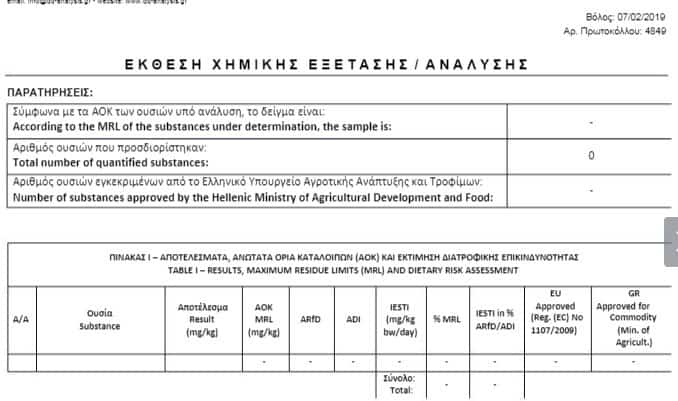
Above you can see a typical residue analysis of a truly organic olive oil. The olive oil is tested for hundreds of different substances that are known to be used in conventional agriculture.
Myrolion always yields no quantifiable substances since we do not use any. Our cold-pressed organic olive oil is safe to use in salads, salad dressings, cooking, or even on its own.
For olive oil to be certified organic, supervision by an Inspection Body is mandatory. As shown in our partners section, Myrolion is overseen by BioHellas. They offer inspection and certification services that follow EU Regulation 834/2007.
BioHellas is recognized as one of the top ten inspection and certification bodies in the world. This ranking comes from the 2008 Organic Certification Directory.
BioHellas confirms that our methods for making and bottling our organic extra virgin olive oil are genuinely organic. We also ensure that our partners follow the same standards.
In the EU it is easy to identify certified organic olive oils through the European Seal of Organic Farming.
In the US this can be done through the USDA Organic logo that proves that the olive oil is USDA Certified Organic.
You can see both logos below. Myrolion is a certified organic olive oil. It meets both EU and US standards. This is possible because of the U.S.-EU Organic Equivalency Agreement.
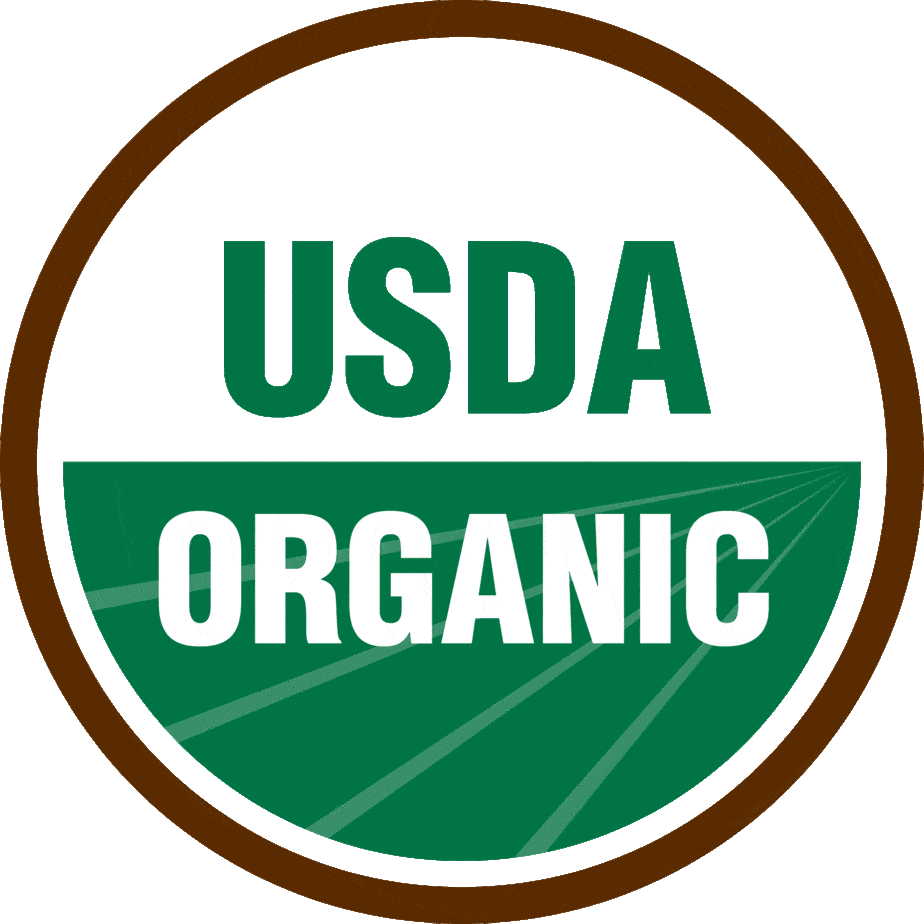

Fraudulent Organic Certifications
Unfortunately, it is possible for various brands to position their products as organic while not actually being organic. This can be done in two ways:
Brands may imply that their products are organic by using terms such as “pure” or “natural.” These terms often mean little. They are used to create a sentimental response from consumers. This makes people believe the products are made ethically, sustainably, and with care for the environment.
Some brands have submitted fake documents or certifications, which is considered fraud. In the USA, around 150 cases of fraudulent organic certifications have been reported.
As a producer of organic food, I know that many people say their olive oil is organic. However, it is important to be careful. Not all olive oils labeled as organic are truly organic.
Unfortunately, there are limits to how much inspection bodies can use technical and management controls. What are these limits?
1. Inspection bodies operate as for-profit companies. They aim to generate revenue by certifying farms as organic. Therefore, they are biased.
2. The public sector mainly focuses on making policies. In some cases, it may not have enough funding to carry out evaluations and controls.
In some cases, you can even get certified online. This means there may not be a physical check on the farm, warehouse, or production site.
An organic certification is important. It helps you find food that is truly organic. However, it does not guarantee that all your food is organic.
How to Identify Truly Organic Olive Oil
Engage with social media guilt-free!
Research your olive oil supplier on social media to find hints of a truly organic production process.
When it comes to olive oil, look for photos of the olive farm. Is the soil covered by vegetation or is it bare and exposed? Try to look for photos of the olive grove through the seasons.
You should expect to see rich vegetation during the Spring, dry or mowed vegetation during the Summer.
The difference between spraying and mowing is that mowing does not remove the vegetation completely. Stock photos are not a good indication since there is no transparency.
To view an example of a truly organic olive grove, feel free to check Myrolion on Instagram.
Finally, remember that a truly organic olive oil producer has nothing to hide. Feel free to contact your producer and ask for documents, photos or other information. Ask about their practices.
Is Organic Olive Oil a Sustainable Food?
As an olive oil producer from Greece, I can specifically express an opinion about Greek olive oil. I cannot say if Italian, Spanish, or olive oils from other countries are made sustainably. This is because the production methods vary by country.
It is true that not all organic food is produced in a sustainable way. Even though organic agriculture produces smaller amounts of greenhouse-gas emissions, it typically provides smaller yields too. As a result, more land is needed, which in turn negates the initial environmental benefits.
However, this is only a very specific model that applies on certain crops and regions. It is not a principle. As a matter of fact, it is possible for organic agriculture to provide equal yields to conventional agriculture.
Additionally, organic farming can absorb more greenhouse gases than it releases. This means it can achieve a carbon negative status.
It all comes down to the approach of agriculture. Since the rise of synthetic pest control products and fertilizers a few decades ago, farmers experienced a big change. The new era of synthetic chemical products made farmers think of their lands as empty fields that they need to fill with nutrients.
Limited access to analysis services has resulted in excessive use of synthetic pesticides and fertilizers, harming environmental balance and contaminating food products.
Unfortunately, this paradigm is preserved in organic farming. Many farmers switch to organic farming to gain extra state support. However, they still use synthetic products for pest control and fertilization, illegaly.
The only difference is that these products are considered suitable for organic farming. As a result, the unsustainable practices that negate the benefits of organic farming continue.
Fortunately, a new way of thinking is emerging. This is what our family and other organic olive oil producers in Greece stand for.
We believe that soil health is very important. We treat our olive farms as a complex ecosystem. This ecosystem is not just a store of nutrients. It is also a place where all forms of life can thrive. This approach helps create a natural balance. This natural balance leads to reduced costs, reduce use of synthetic products and great yields.
The claim that Greek olive farms need more land for organic farming to be financially sustainable is false.
80% of Greece is covered by mountains. Simply put, there is not more land for organic olive groves to expand to.
Greek producers who switch to organic olive farming alter how they grow their current trees, rather than buying more land. This leads to higher quality products and thus prices.
As a result, it is safe to claim that Greek organic extra virgin olive oil is a sustainable food.
Is Organic Olive Oil a Waste of Money?
To my surprise, this has been implied. Various conventional olive oil distributors and retailers say that the olive tree is very strong. They claim it does not need pest management or fertilization. As a result, the only difference between organic and conventional olive oil is the price.
This is a lie. Conventional olive farming uses significant amounts of synthetic pesticides and fertilizers. In some cases, pesticide use is so high that pests become immune to it. This can cause a chain reaction that harms the environment.
What are the Best Organic Olive Oil Brands?
When choosing the best organic olive oil brands, it is important to look at who sells and manages them.
(Online) Grocers
They curate and offer a variety of brand collections. Typically, these shops do not oversee the production or quality of the items. Consequently, they focus on brands that invest heavily in marketing to establish a high-end reputation.
These distributors primarily manage customer service and marketing initiatives. Although they are easy to buy from, they tend to lack transparency.
Local Distributors
It is common for some brands to represent regions or specific olive oil extraction facilities. These local distributors have a consistent product in terms of sensory features, and therefore a limited diversity of oferrings.
However, it is hard to guarantee the quality of olive oil, especially regarding pesticides. This is because there is no control over the practices in the olive orchards.
Brands tied to specific orchards
This category exhibits the least variety, as it usually consists of just one type and quality of olive oil.
This option provides the most transparency. Consumers can see the exact trees that produce their olive oil. They can also talk directly to their olive oil producer. This allows consumers to develop expertise and make better choices overall.
Myrolion, our family’s organic polyphenol-rich olive oil, belongs to this category.
Brands that explain their farming methods are more likely to offer good products. They should share details about where they get their ingredients and any certifications they have. This openness helps create trust and even friendship with our customers.
Additionally, consider those that engage in community initiatives and olive farming research projects as this often reflects higher expertise and responsibility.
Reading customer reviews and asking trusted sources for recommendations can help you find good brands. Please ensure the reviews are genuine. It is usually easy to identify manufactured reviews as they can be generic or overly positive.
It is important to note that many olive oil brands offer organic products. However, this does not mean they are fully committed to organic farming.
In many cases, these organic products make up only part of their production. The rest of their operations often use conventional farming methods. This can include synthetic pesticides, herbicides, or fertilizers.
A truly organic farm is fully committed to sustainable practices in all its orchards. It follows strict standards that focus on soil health, biodiversity, and the absence of synthetic chemicals.
This commitment to organic farming can be challenging. Farmers must keep certifications and manage pests and diseases naturally. However, this effort leads to a product that better supports sustainability and environmental care.
Choosing oils from fully organic farms supports this philosophy and ensures a more transparent, eco-conscious production process.
In this regard, I would like to recommend a few brands of 100% organic olive oil. One such brand is Myrolion, which I oversee personally, from the soil of the orchard to the content of this article.
Other brands I have either visited or studied include Argali from Greece and La Magnanerie from France. The list will grow as I visit more producers over the years.
100% Organic Olive Oil Brands
I would like to recommend a few brands of 100% organic olive oil. One such brand is Myrolion from Volos, Greece, which I oversee personally, from the soil of the orchard to the content of this article.
Other brands I have either visited or studied include:
- Argali from Peloponnese, Greece:
Single estate, fully organic olive oil. Balanced and suitable for everyday use. - Pamako from Crete, Greece: Single estate, fully organic, premium olive oil. Ideal if you are actively battling a serious health condition, due to its very high polyphenol content.
- La Magnanerie from Provence, France:
Single estate, fully organic, premium olive oil. Various olive oils to choose from, with diverse sensory features for all tastes. - The list will grow as I visit more producers over the years.
Is Myrolion Organic?
Well, see for yourself!
The short videos below are everyday examples of how our orchards are a living olive forest.
Our family consumes the same olive oil daily. We are olive oil producers and olive oil consumers simultaneously. We wouldn’t be happy to know that our food is jammed with pesticides and herbicides. However, industrially prepared herbicides, pesticides and fertilizers allow farmers to deal with a plethora of otherwise serious challenges quickly and usually affordably. So, what do we do instead?
Hard Labor
Lots and lots of manual labor while farming. What herbicides do in one hour, we do in days of hard work. For example, in late summer, we usually cut weeds and let them rest on the soil. This helps them turn into organic matter that will benefit our land in the long run. Other farmers prefer to spray them with questionable synthetic mixes and complete the process in a day. We take our time to cut these weeds by hand. Organic EVOO is the definition of slow food.
Nature Leads the Way
We let Nature do her job. Permaculture enables legumes and other naturally-occurring plant species to feed our olive trees. We also utilize organic manure from neighboring livestock farmers to enrich our soils with organic matter. Additionally, we engage in no-tilling to protect soil from erosion and nutrient depletion. While other olive oil producers use industrial chemicals, which harm the land, we choose to follow Nature’s example.
Smart Pest Control
We fight pests with trapping and fruit camouflaging techniques instead of potentially harmful chemical sprays. Climate change is a major challenge. Mild winters and humid summers help pests thrive, especially the olive fruit fly. We make sure to always be one step ahead through real-time weather monitoring.
Continuous Education on Sustainable Cultivation
Our family is a proud member of Regeneration International and we are continuously increasing our understanding on soil health, diversity and overall balance. This allows us to constantly improve our practices for the benefit of our land, trees and customers.

